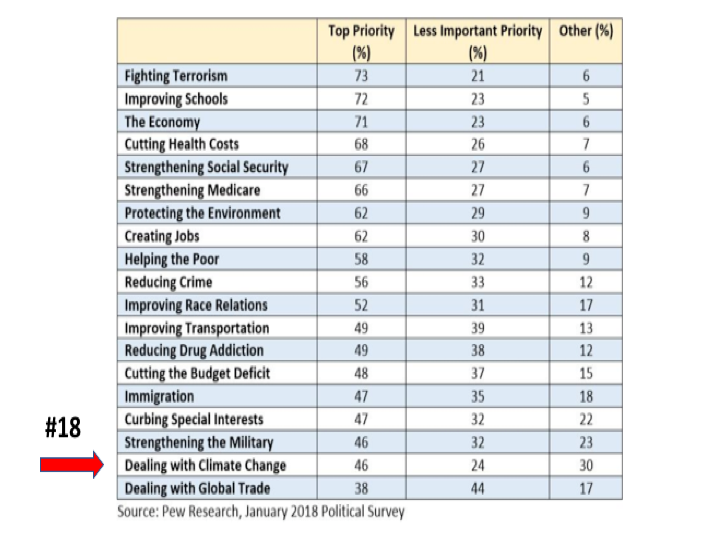Will You Vote Climate Change as a Priority?
 Next Tuesday–November 6–is Election Day in the United States. Even though about a third of my blog readers are outside the U.S. I want to make a point about Climate Change and voting — which applies regardless of where one lives. Dealing with climate change, both slowing it, and adapting to that which is now unstoppable, will take leadership –– Leadership in government at all levels, the business community, and the public.
Next Tuesday–November 6–is Election Day in the United States. Even though about a third of my blog readers are outside the U.S. I want to make a point about Climate Change and voting — which applies regardless of where one lives. Dealing with climate change, both slowing it, and adapting to that which is now unstoppable, will take leadership –– Leadership in government at all levels, the business community, and the public.
The ballot box is where we each get to choose leaders and make our priorities clear. Politicians are very aware of the top few issues that can get them into office, and those that can remove them from office. Many in the U.S. see this election as an affirmation of, or push-back against, the policies of President Trump, even though he is not on the ballot this year. It is worth looking beyond the Trump surrogate view. Americans are increasingly aware of and concerned about climate change, crossing party lines in some cases.
46% say combating global warming should be “top priority”; 24% say it is “important”
To quote a recent article in Investors Business Daily, most Americans now want tougher action against global warming:
One question on a 2018 Gallup Poll asked whether “the effects of global warming have already begun.” A stunning 60% said “yes,” up substantially from 48% in 1997. When the question was presented in a slightly different way —”Do you think global warming will pose a serious threat to you or your way of life in your lifetime” — the answer was even more dramatic; 45% said “yes,” up from 25% in 1997. Gallup’s answers were not flukes. Two-thirds of respondents (64%) attributed the rise in global temperatures mainly to human activity. When asked whether they worried about this, two-fifths (43%) said “a great deal” and one-fifth (20%) said “a fair amount,” report Bowman and O’Neil. As for combating global warming, a 2018 Pew poll found that 46% of respondents thought it should be a “top priority” of government and 24% said it was “important” but a lower priority.
Climate change is only #18 as a political priority for Americans
Yet on a list ranking national political priorities by Americans reveals a very different picture as shown in this poll by the PEW Charitable Trusts. Out of nineteen issues, dealing with climate change was next to last, #18. No wonder our elected representatives think it is of secondary interest and therefore something that can be overlooked or sidestepped.

But the steady warming of our planet, with changes to our climate, weather, shorelines and ecosystems will likely become true existential issues in the coming decades. If the term existential seems figurative here, it is not. Literally, we are now looking at an issue that could determine our ability to exist beyond this century. In the last thirty years, the forecasts of leading climate scientists like Dr. James Hansen have proven remarkably accurate. The forecast for the next thirty years is truly dire. I believe this is the key moral and ethical issue of our time. If not THE highest priority, at least it should be second to none. According to the poll data shown above, we are signaling otherwise.
What You Can Do in the Next 7 Days – “Vote Climate Change”
In this final week before election day, we can each look at key candidate’s websites in our area. Look at their policies under climate change, probably under the category, “environment.” See if they make it a serious issue. If they do, check further to see if they can separate the climate change issues, from the general “green” environmental issues such as recycling and plastic pollution. Those last two are very important, but have little to do with climate change. Often they can be used to distract voters from the key issues such as the need to shift to renewable energy. Below are two websites that also rate candidates on their climate views.
If you are willing to “vote climate change” let the candidates know, regardless of which side of the issue they are on. If you are polled, either by phone or coming out of the voting both, make it known that you consider climate change a top priority, that affects how you vote. You can also send the candidates and incumbents an email, post on their Facebook page, or call their office to tell them that their position on climate change was a primary determining factor in your voting for them, or NOT. Share this approach with friends, family, and those in your network. They will get the message. That will have impact this election, and even more between now and the next election.
“We have met the enemy, and he is us.”
I am reminded of a famous cartoon called POGO, by Walt Kelly, back in 1971. One particular phrase became a punchline: “We have met the enemy, and he is us.” In the largest collective sense, “we” are responsible for climate change. We need to do more than just complain. We must make clear to all elected leaders where climate change ranks on our priorities.
As the latest official climate report stated a few weeks ago, we now have our backs against the wall. We have only a few years to avoid disaster. By action or inaction, we are writing the story of climate change and the human race. We all need to see this for what it is. If we do not vote, if we do not make clear that we are extremely concerned about climate change, it is our fault that our political leadership thinks it is priority #18.
Vote.
